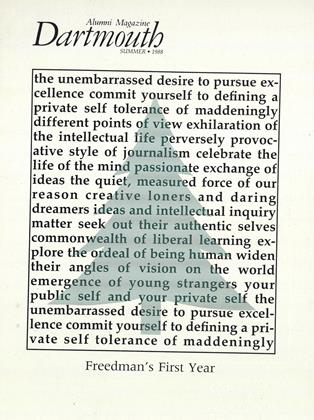A class prepares to "traverse the starlit deserts of truth"
For the first three Dartmouth commencements, the New Hampshire governor provided a hogshead of rum so potent that the cooks were incapacitated. At its two hundred eighteenth commencement this past June, the College provided the refreshmentfree lemonade on the Green. As Richard Hovey would say, the curriculum has changed.
Another aspect of the ceremony survived unscathed. Exactly 150 years ago, Ralph Waldo Emerson exhorted Dartmouth graduates to seek a loftier calling. "Why," he asked rhetorically, "should you renounce your right to traverse the starlit deserts of truth, for the premature comforts of an acre, house, and barn?" This year's commencement speaker, children's advocate Marian Wright Edelman, similarly appealed to her audience's higher sensibilities. "Willingness to protect children is a moral litmus test of any decent and compassionate society," she said.
Society is dominated by "people who think of government as a presumptively illegitimate enterprise,' Edelman asserted, adding: "If the public purposes of one's job are not considered a high calling, and if government has no purpose other than its own destruction, the restraint against unethical behavior in both the public and private sectors quickly erodes. As a result, for every Michael Deaver and Lynn Nofziger there is an Ivan Boesky and a Reverend Jim Bakker and his Tammy."
Edelman, a Yale Law School graduate who became the first Black woman to be admitted to the Mississippi bar, urged the graduates to speak out against and help redirect the misguided national investment priorities of this decade which have placed missiles and bombs ahead of mothers and babies and families." Implying that this is a matter of national security, Edelman said: "if the foundation of your national house is crumbling, you don't say you can't afford to fix it within while building multitrillion-dollar fences to defend it from enemies without."
For her work in defending the nation's children, Dartmouth awarded Edelman an honorary law doctorate. Author John Updike and China scholar John Fairbank also received degrees. In addition, three alumni returned to Hanover to collect honors: circus impresario Paul Lewis Binder '63, journalist David John Bradley '38, and medical researcher Paul Charles Zamecnik '33
For her work in defending the nation's children, Dartmouth awarded Edelman an honorary law doctorate. Author John Updike and China scholar John Fairbank also received degrees. In addition, three alumni returned to Hanover to collect honors: circus impresario Paul Lewis Binder '63, journalist David John Bradley '38 and medical researcher Paul Charles Zamecnik '33.
The class of '88 produced some notable graduates of its own:
• Two sets of twins, Kimberly and Valerie Fasolo, and Daniel and David Luczkow. Cost for the degrees: about $60,000 per set.
• This year's oldest graduating students, Edward Mortimer and Alan Smith. Mortimer left Dartmouth for Los Angeles in 1970 and became a professional musician. Smith dropped out in 1973 and worked at Mary Hitchcock Hospital. Mortimer plans to work on computers and Smith will become a graduate student at Cornell this fall.
• Korley, a two-year-old golden retriever. Okay, the dog didn't graduate from Dartmouth, but it did attend class with graduating senior Susan Urben, who trained Korley as a seeing-eye dog. Urben plans to attend medical school while Korley enters the work force.
Wearing what passes for academicrobes, seeing-eye apprentice Korley(right) accompanies Susan Urben '88.On class day, seniors lit up beforethey lit out (left). HistoryProfessor Mary Kelley and ClassOrator Kimberly Bomar '88 spoke.
 View Full Issue
View Full Issue
More From This Issue
-
 Feature
FeatureDifferent Drummers
June 1988 -
 Feature
FeatureSUBJECT: HALF OF HUMANITY
June 1988 By Karen Avenoso '88 -
 Feature
FeatureRising Sophomore
June 1988 By Jay Heinrichs -
 Feature
FeatureTo Fix Up Webster Hall, Take a Cue from Plato
June 1988 By Brad Denny '63 -
 Feature
FeatureNext Month: A (Not Altogether) New Look
June 1988 -
 Feature
FeatureA Reunion Portfolio
June 1988
Features
-
 Feature
FeatureTrustees Meet with Alumni Council
FEBRUARY 1972 -
 FEATURES
FEATURESMy Dog Likes It Here
MARCH/APRIL 2023 By COREY FORD -
 FEATURES
FEATURES“We Are Your Only Hope”
MAY | JUNE 2023 By Jennifer Wulff ’96 -
 Feature
FeatureNotebook
May/June 2007 By JOHN SHERMAN -
 Feature
FeatureWHOOOSSHH!!!!
December 1991 By Jonathan Douglas '92 -
 Feature
FeatureBehind the Scenes
MARCH | APRIL By LISA FURLONG


